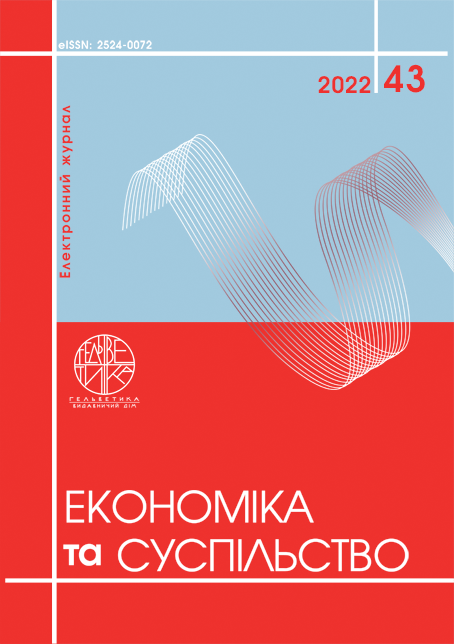METHODS OF SELF-MOTIVATION AND THEIR SIGNIFICANCE FOR INCREASING THE EFFICIENCY OF THE MANAGER'S ACTIVITIES
Abstract
The article is devoted to the study of self-motivation methods and their importance for increasing the efficiency of a manager's activities. The essence of the concept of self-motivation is revealed, as a form of satisfaction of one's own needs and achievement of values independently adopted by a social subject, which involves a rational understanding and evaluation of oneself by a person. It was determined that one of the main properties of managers' self-motivation is the formation of a special socio-psychological state of a person's inclusion in the process of the organization's activity and interest in its results. It is noted that its consequence is not only the final indicators of the effectiveness and efficiency of the organization's activity (labor productivity, profitability, volume of sales or production), but also its acquisition of additional competitive advantages of a high order, which ensure sustainability for a long time. The necessary conditions for self-motivation and the algorithm for its implementation are defined. A number of methods of self-motivation of managers are singled out: «to the stars», «horror movie», conscious choice, effect of urgency, «sword of Damocles», success diary, reframing, «pie of time», «anchoring», «wheel of life», «сarrot and stick». Their content, advantages and disadvantages are revealed, and a thorough description is given. The main attention is paid to the fact that self-motivation is a complex multi-level regulator of a person's life, as an «alloy» of the driving forces of his behavior and activity. It is emphasized that it is a personal arbitrary process of managing one's own activity, which is systematically carried out by a person on the basis of understanding the current and desired state of affairs in a specific situation. It was concluded that when implementing any of the methods of self-motivation, it is necessary to take into account the fact that the same method can have an absolutely opposite effect on different categories of managers, depending on their subjective perception of reality, the company's goals and mission, their own goals, an idea of one's future, temperament, etc. It is clarified that in practice it is necessary to apply various methods of self-motivation in their relationship and choose those that allow taking into account individual characteristics and are the most effective for a specific person.
References
Анасов Б. Л. Персональний менеджмент як фактор підвищення ефективності керівника. Молодий учений. 2016. № 24 (128). С. 147–151. URL: https://moluch.ru/archive/128/35558/ (дата звернення: 26.09.2022).
Булах Т. М. Методи самомотивації в тайм-менеджменті. Матеріали VIІІ Міжнародної науково-практичної конференції «Стратегія розвитку України: фінансово-економічний та гуманітарний аспекти» (м. Київ, 15 жовтня 2021). Київ : Інформаційно-аналітичне агентство, 2021. С. 176–177. URL: http://194.44.12.92:8080/jspui/bitstream/123456789/6005/3/1%20%286%29.pdf (дата звернення: 16.10.2022).
Мнацаканян В. Д., Сорокіна Ю. В. Мотивація и стимулювання трудової діяльності в контексті концепції емоційного інтелекту. Journal of Economics, Entrepreneurship and Law, 2020. Vol. 11. Pp. 2885–2904. DOI: https://doi.org/10.18334/epp.10.11.111101
Мочалова М. С. Самоорганизация, мотивация и самомотивация как основа успешной учебно-профессиональной деятельности студентов физкультурных вузов. Ученые записки университета имени П. Ф. Лесгафта. 2012. № 9 (91). С. 115–118. URL: http://lesgaft-notes.spb.ru/ru/node/3783 (дата звернення: 6.10.2022).
Панова Н. В. Роль самоменеджмента, мотивации и рефрейминга в достижении эффективной деятельности специалиста. Экономикс. Актуальные вопросы менеджмента и маркетинга. 2012. № 2. С. 15–19.
Причепа І. В., Соломонюк І. Л., Лесько Т. В. Тайм-менеджмент як дієвий інструмент ефективного використання часу успішного менеджера за сучасних умов. Ефективна економіка. 2018. № 12. URL: http://www.economy.nayka.com.ua/pdf/12_2018/106.pdf// (дата звернення: 18.10.2022).
Пугачева В. П. Мотивация трудовой деятельности : учеб. пособ. Москва : ИНФРА-М, 2008.
Stein, S., & Book, H. (2015). The EQ Edge: Emotional Intelligence and your success. Toronto,Canada: Stoddart Publishing Co. Limited.
Anasov, B. L. (2016) Personalnyi menedzhment yak faktor pidvyshchennia efektyvnosti kerivnyka [Personal management as a factor in improving the manager's efficiency]. Molodyi uchenyi – Young scientist, 24 (128), 147–151. Available at: https://moluch.ru/archive/128/35558/ (last accessed 2022.09.26). (in Ukrainian)
Bulakh, T. M. (2021) Metody samomotyvatsii v taim-menedzhmenti [Methods of self-motivation in time man¬agement]. Materialy VIII Mizhnarodnoi naukovo-praktychnoi konferentsii «Stratehiia rozvytku Ukrainy: finanso¬vo-ekonomichnyi ta humanitarnyi aspekty (m. Kyiv, 15 zhovtnia 2021) – Materials of the VIII International Scientific and Practical Conference «Development Strategy of Ukraine: Financial, Economic and Humanitarian Aspects» (Kyiv, October 15, 2021). Kyiv: Informatsiino-analitychne ahentstvo, 176–177. Available at: http://194.44.12.92:8080/jspui/bitstream/123456789/6005/3/1%20%286%29.pdf (last accessed: 2022.10.16). (in Ukrainian)
Mnatsakanian, V. D., & Sorokina, Yu. V. (2020) Motyvatsiia y stymuliuvannia trudovoi diialnosti v konteksti kontseptsii emotsiinoho intelektu [Motivation and stimulation of labor activity in the context of the concept of emo¬tional intelligence]. Journal of Economics, Entrepreneurship and Law, 11, 2885–2904. DOI: https://doi.org/10.18334/epp.10.11.111101. (in Russian)
Mochalova, M. S. (2012) Samoorganizaciya, motivaciya i samomotivaciya kak osnova uspeshnoj ucheb¬no-professional'noj deyatel'nosti studentov fizkul'turnyh vuzov [Self-organization, motivation and self-motivation as the basis for successful educational and professional activities of students of sports universities]. Uchenye zapiski universiteta imeni P. F. Lesgafta – Scientific notes of the University named after P. F. Lesgaft, 9 (91), 115–118. Available at: http://lesgaft-notes.spb.ru/ru/node/3783 (last accessed 2022.10.6). (in Russian)
Panova, N. V. (2012) Rol' samomenedzhmenta, motivacii i refrejminga v dostizhenii effektivnoj deyatel'nosti specialista [The role of self-management, motivation and reframing in achieving the effective activity of a specialist]. Ekonomiks. Aktual'nye voprosy menedzhmenta i marketinga – Economics. Current issues of management and marketing, 2, 15–19. (in Russian)
Prychepa, I. V., Solomoniuk, I. L., & Lesko, T. V. (2018) Taim-menedzhment yak diievyi instrument efek¬tyvnoho vykorystannia chasu uspishnoho menedzhera za suchasnykh umov [Time management as an effective tool for effective use of the time of a successful manager under modern conditions]. Efektyvna ekonomika – Efficient economy, 12. Available at: http://www.economy.nayka.com.ua/pdf/12_2018/106.pdf (last accessed: 2022.10.18). (in Ukrainian)
Pugacheva V. P. (Ed.). (2008) Motivaciya trudovoj deyatel'nosti: ucheb. posob. [Work motivation: textbook]. Moskva: INFRA-M. (in Russian)
Stein, S., & Book, H. (2015) The EQ Edge: Emotional Intelligence and your success. Canada: Stoddart Publishing Co. Limited.


